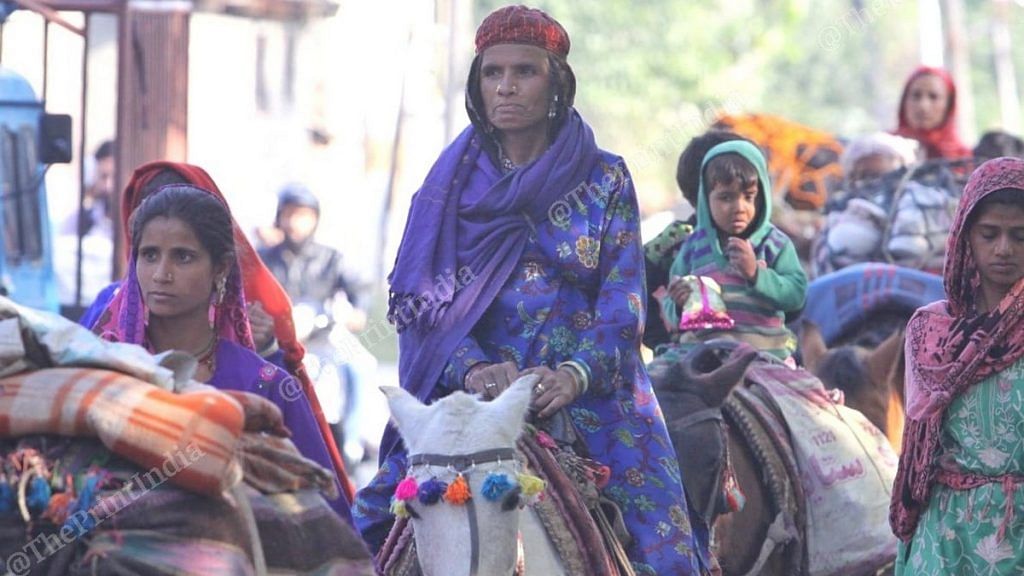Srinagar: Winter has come early this year for the nomadic Bakarwal tribe of Jammu and Kashmir, many of whom travel with their families, bedding and livestock from the plains of Jammu to the cooler climes in Kashmir valley around March every year.
The community, all Sunni Muslims, again pack up and begin moving from the upper reaches such as Sonmarg to the plains of Jammu starting November in order to avoid the harsh Kashmir winters.
But the security and communication clampdown, following the scrapping of Article 370 on 5 August, has forced many Bakarwals to advance their return journey by as much as two months.
Sixty-year-old Abdul Rabbari and his fellow tribals — 20-odd people comprising men, women, children, mules and dogs — are on their way back to Rajouri. “Generally, we leave Sonmarg by mid-October, before the place gets covered in snow. But this time we started our return journey in mid-August. Many of the other groups have left too because of restrictions on movement,” Rabbari said, as the group passed through Srinagar’s streets Sunday morning. He is the head of this group of Bakarwals.
The tribe rears sheep for livelihood and helps people, especially tourists, journey through the land, transporting their goods on the back of mules.
Abdar Rashid, whose family of six is part of Rabbari’s group, said they could hardly do any business because of the strict restrictions this time. “Despite being a peak season, there were few tourists. It is becoming difficult to make ends meet. Even procuring ration items has become a big issue as most of the shops are closed,” he said.
Asked what revocation of Article 370 meant for the tribe, Rashid said, “How does it matter to us? We are more concerned about making ends meet.”
The group, which comprises a few elderly women and young children, travel on foot the whole day, taking a small break after every 10 km. The Bakarwals and Gujjars are the two predominant nomadic tribes of J&K.
“We halted the night near a forest in Ganderbal. It will take us another 10 days to reach Rajouri,” said Mohammad Hussain, another member of the group.
They will spend the winters in their village in Rajouri before leaving again for the upper reaches in Kashmir. “In the summers, it becomes unbearable for our cattle and livestock in the plains. So we move to the hills,” Hussain said.
Also read: Bunkers back in Srinagar, another reminder of militancy days as security restrictions stay
Normalcy yet to return to Kashmir
Monday marked the 50th day of Kashmir shutdown. Even as the administration started lifting restrictions on movement and allowing public and private transport on the roads, many shopkeepers are still keeping shutters down for the major part of the day.
Except for some pharmacies and a handful of grocery shops, which stay open between 6 am and 9 am, a majority of the business establishments remain shut.
“This is the only time during the day that you will see traffic on the streets with people rushing to buy essential items,” said Asgar Ramzan, a Srinagar resident.
Government offices opened Monday. While schools have re-opened also, attendance continues to be thin. Landline connections have been restored but communication continues to be crippled in the absence of mobile and internet connectivity.
“You can’t call the present situation normal by any stretch of the imagination. We Kashmiris are feeling betrayed. I can only see the discontent growing. In this day and age, denying internet and mobile connectivity is akin to putting us back to the stone age,” said a doctor at the Shri Maharaja Hari Singh Hospital, who did not want to be named.
Communication clampdown is what has irked public the most. Government officials said it will take time before mobile phone connections are restored. “We are taking one step at a time. There is a feeling among the security establishment that allowing mobile connectivity will make it prone to misuse,” a senior J&K cadre IAS officer, who did not wish to be identified, told ThePrint.
Senior officials are keeping a close watch on the ground ahead of the United Nations General Assembly meeting scheduled to be held in New York on 27 September. “We are on high alert to prevent any untoward incident,” said a J&K Police officer.
Also read: J&K cops can’t please anyone — Kashmiris call them traitors, central forces mistrust them
